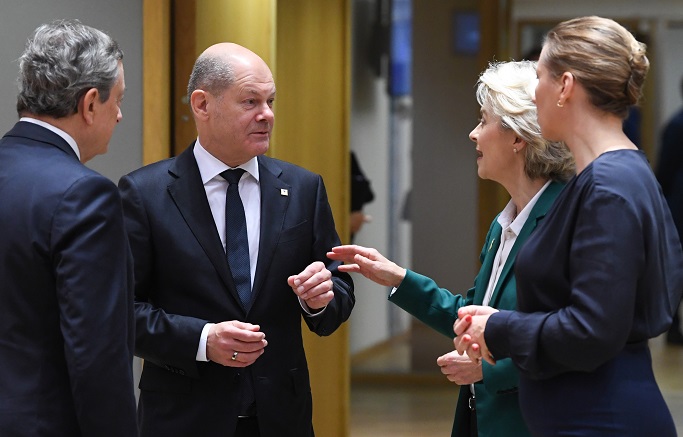Germany increasing pressure to ease its concerns over gas prices
Published : 21 Oct 2022, 21:02
Support for Ukraine and relations with China occupy European Union leaders on the second day of a Brussels summit after a laborious agreement to cap the price of gas to limit extreme peaks.
Leaders tasked the European Commission and EU energy ministers to work out in detail how "excessive" price peaks within a trading day for short-term gas contracts could be capped.
"What happened yesterday is that we listen to each other. And this is not about one blocking the other, this is about some countries having legitimate concerns," Belgian Prime Minister De Croo said before day two of the summit kicked off on Friday.
Germany had come under increasing pressure to ease its opposition over concerns that lower gas prices would put supply safety at risk or increase consumption.
After more than 10 hours of talks German Chancellor Olaf Scholz conceded that limiting price volatilities "certainly makes sense."
EU leaders fell short of backing measures which would directly impact consumer prices in the short term.
Turning to foreign policy, EU leaders will discuss their support for war-torn Ukraine on Friday.
In May, the European Commission proposed providing €9 billion ($8.8 billion) in grants and loans to Ukraine to keep its civilian administration running, but only a third has been disbursed so far, leading to calls to improve the way in which Ukraine receives aid.
The bloc’s relationship with China is also on the agenda with the discussion focusing on whether Beijing should be seen as a rival, competitor or partner depending on geopolitics, trade or fighting climate change.
"I think with China [it] is the same as with Russia. It is in their interest that we are divided. It's in our interest that we are united and talk with one voice," Estonian Prime Minister Kaja Kallas said upon arriving.
The German chancellor is scheduled to embark on a visit to China in November together with a business delegation.
The trip has sparking criticism that Scholz is sending a too-friendly signal during a time of heightened tensions over Beijing's support for Moscow and its hardening stance toward Taiwan.
Finnish Prime Minister Sanna Marin defended Scholz's trip saying it was "natural" for EU countries to have bilateral relations with Beijing.
"I think that over the past month we've understood that in a lot of pure economic domains geopolitics also plays an important role," said De Croo, adding that European countries have been “a bit too complacent” in the past.
Latvian Prime Minister Krisjanis Kariņs echoed his Estonian counterpart.
He also said it was important to ensure China is “on the right side of history regarding Russia’s war of aggression against Ukraine.”
The EU is hoping to deter China from supplying weapons to Russia, with no evidence of such a support found so far, an EU official said.
EU leaders will also discuss current developments regarding Iran after new sanctions on Tehran came into force on Thursday in response to the West's allegation that Iranian-made "kamikaze" drones are being used by Russia in Ukraine.


